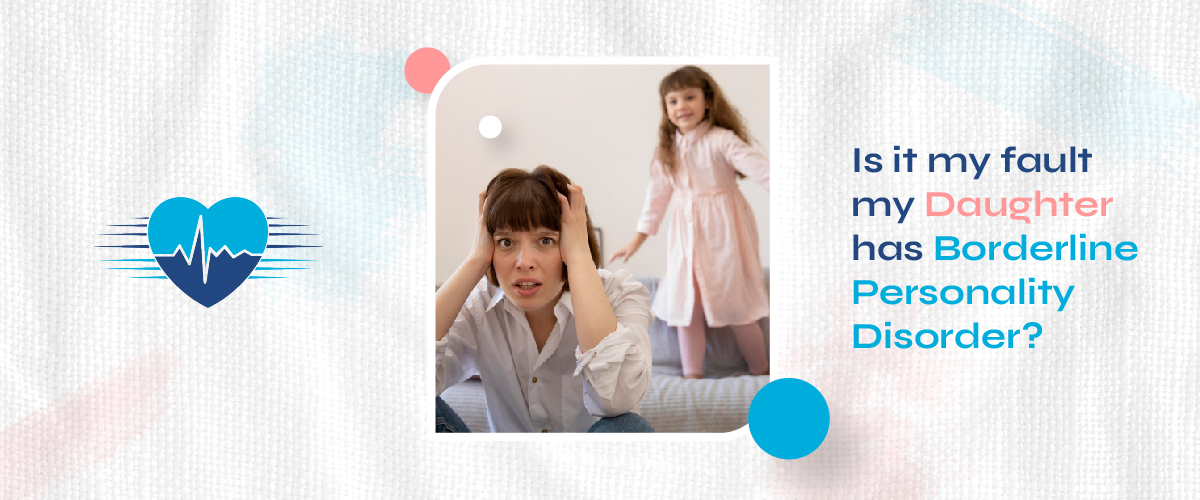Borderline Personality Disorder (BPD) is a complex mental health condition. It affects how a person thinks, feels, and interacts with others.
Intense mood swings, unstable relationships, impulsivity, and a distorted self-image characterize it.
Today Telemedicine offers psychiatry services, recognizing the critical link between mental health and overall well-being.
Contact us today for support and treatment for BPD through our psychiatry services.
If you are a parent of a child diagnosed with BPD, it is natural to wonder if you played a part in causing it.
After seeing the signs, doing research, and getting your child diagnosed, you may ask yourself, “Is it my fault my daughter has borderline personality disorder?”
Below, we will discuss this sensitive topic with empathy and understanding.
We will explore what BPD is, and its causes, and dispel common myths, offering support and guidance along the way.
What Is Borderline Personality Disorder?
Before discussing fault, it is important to understand what BPD is.
Borderline Personality Disorder (BPD) is a complex mental health condition. It involves impulsiveness and instability in relationships and self-image.
According to the DSM-5, BPD is grouped with other disorders like Narcissistic Personality Disorder.
While most sources report that BPD is more common in women (around 75%), some studies suggest it affects men and women equally.
What Causes BPD?
BPD is not caused by a single factor but rather a combination of influences:
- Genetics: BPD can run in families, indicating a genetic link.
- Environment: Childhood experiences, such as trauma or unstable family situations, can contribute.
- Brain Differences: Variations in how the brain regulates emotions and impulses may play a role.
Understanding Borderline Personality Disorder Mother-Daughter Relationships
A mother-daughter relationship is naturally complicated. If my daughter has BPD, it becomes even more challenging.
BPD’s strong emotions and fear of being alone can test this connection, causing regular confusion and emotional ups and downs. In BPD, mother-daughter relationships shift often:
- High emotional sensitivity
- Frequent arguments or conflicts
- Strong dependency coupled with fear of closeness
- Cycles of idealization and devaluation
Is It My Fault My Daughter Has Borderline Personality Disorder?
No, you are not responsible for your daughter having BPD. Mental health conditions like BPD arise from a combination of genetic, biological, and environmental factors.
When your daughter has BPD, your role as a parent is to support your daughter with compassion and seek professional help for her treatment and well-being.
Blaming yourself is unproductive; instead, focus on providing understanding and support.
Living with a Daughter Has BPD
Daily life with a BPD daughter can be challenging. Here are some strategies to help manage this complex relationship.
- Brace yourself for emotional roller-coasters.
- Cultivate patience and personal well-being.
- Utilize peaceful, transparent dialogues.
- Steer is clear of aggravating arguments.
- Understand her emotions without endorsing harmful actions.
Myths About Borderline Personality Disorder
Here are some common misconceptions about BPD, along with the facts:
Myth: People with BPD are manipulative and just want attention.
Fact: People with BPD have intense emotions and a fear of abandonment. Their actions may seem manipulative, but they are struggling with their feelings.
Myth: BPD is not a serious problem.
Fact: BPD is a serious mental health issue that can interfere with daily life, relationships, and emotional management. Without help, it can lead to significant distress and even suicidal thoughts.
Myth: People with BPD cannot get better.
Fact: Many people with BPD improve with treatment, including therapy and sometimes medication. They can learn to manage their symptoms and lead fulfilling lives.
Myth: Only women have BPD.
Fact: BPD affects both men and women. Although it is diagnosed more often in women, men can also have BPD, which may present differently.
Myth: People with BPD are always difficult and have no empathy.
Fact: People with BPD often feel emotions very strongly, including empathy for others. They may struggle with relationships, but they can still care deeply and improve their interactions with support.
Borderline Personality Disorder Silent Treatment
In BPD, the silent treatment is a behavior where someone stops talking to express their feelings or control others.
It is a way of punishing or manipulating people by ignoring them intentionally.
- People with BPD may use silence to express their emotions or to control situations.
- They may refuse to talk as a means of punishing or gaining power over others.
- It is best not to become upset or react emotionally when someone with BPD gives you the silent treatment.
- Instead, gently encourage the person, such as your daughter, to share their feelings more positively and openly.
No Contact with BPD Daughter
In extreme cases, some families consider going with no contact. This decision should not be taken lightly.
It may be necessary for self-protection or to prevent further harm. Going with no contact can be emotionally painful but may provide necessary relief and space for healing.
Conclusion
So, is it my fault my daughter has Borderline Personality Disorder? The answer is complex.
While parenting does play a role in a child’s development, BPD is influenced by factors beyond your control.
Your role now is to provide support, empathy, and understanding to your child.
By learning about BPD, seeking help, and offering empathy, you can create a positive environment for your child and yourself.
Remember, you are not alone. Many parents face similar challenges, and seeking support from others can be invaluable.
Today Telemedicine offers psychiatry services for treating BPD. Contact us today for support and treatment.
FAQs
How can I handle it when my daughter finds fault with everything I do?
Address her concerns calmly, and try to understand her perspective to promote constructive communication.
What should I do if my daughter has BPD and hates me?
Seek help from a therapist experienced in BPD. They can assist both of you in understanding and managing these difficult emotions.
Is BPD more common in daughters than sons?
BPD affects both genders, but diagnosis rates can vary due to social factors.
Can BPD be inherited from mothers?
Genetics may play a role in BPD, but it is influenced by multiple factors, not just maternal inheritance.
What are some myths about BPD that I should be aware of?
Common BPD myths include beliefs that individuals with BPD are manipulative or only seeking attention. Understanding the facts helps in providing better support.





